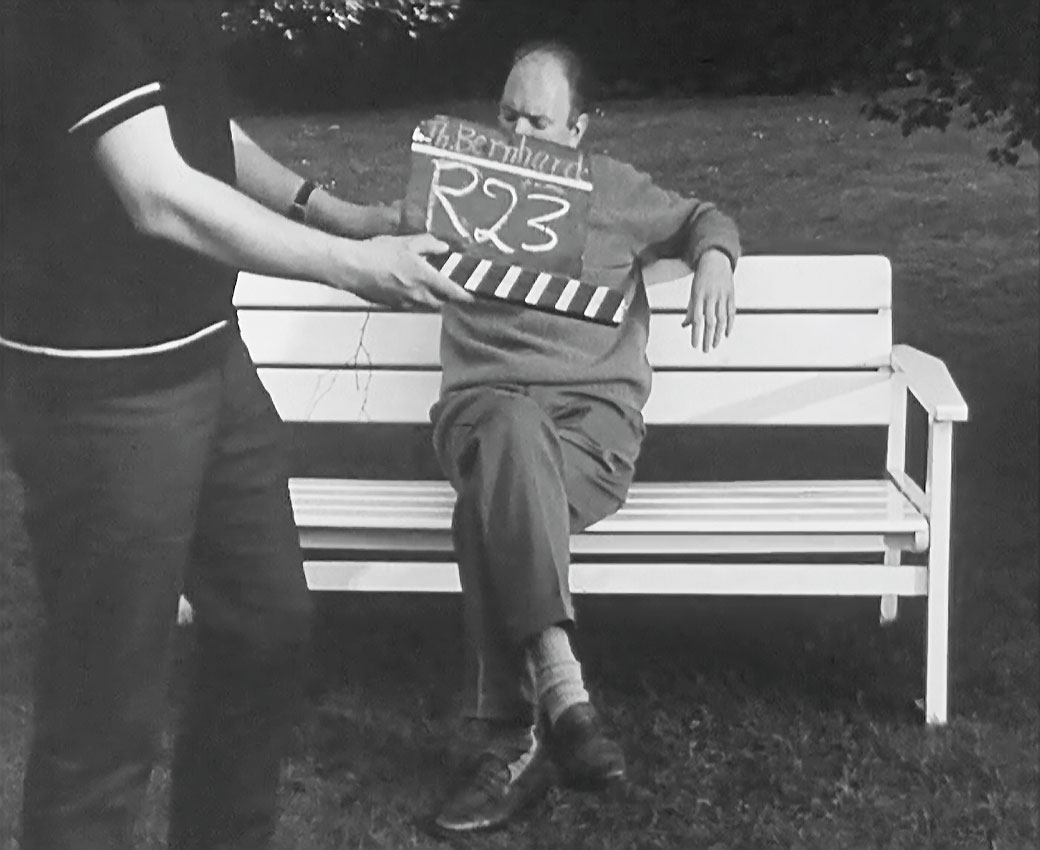In Thomas Bernhard: Three Days, a documentary filmed in Hamburg in 1970, the Austrian novelist and playwright says, “As far as I am concerned, I am no writer, I am somebody who writes.” For Bernhard—known for his rant-like novels, at once devastating and entertaining, that criticize seemingly everything in a torrent of piercing observations and mordant epigrams—this distinction was crucial. Many of his clever, caustic narrators are artists or writers, such as the failed concert pianist in The Loser, the misanthropic Austrian musicologist in Concrete, and the writer in Woodcutters who recalls his hatred of old artistic acquaintances in Vienna. These cantankerous, lonely men see vanity, hypocrisy, and idiocy everywhere, and believe that they can only escape condemnation by showing the world its own folly. Perhaps because of the almost redemptive value they place on art, their strongest rebukes are aimed at hacks—artists who seem more interested in fame and accolades than in the creation of meaningful work.
It’s surprising, then, that Bernhard would agree to star in a documentary about his own life and work. (A new book featuring a translated transcript as well as a number of stills has just been released.) Although films about writers may satisfy the curiosity of readers—who might wonder what their favorite authors look like, what they sound like, or whether their work is somehow apparent in their personality—the actual process of writing and revision can make for tedious viewing. By participating in Three Days, Bernhard risked turning himself into writer, not someone who writes.
Thankfully, Bernhard had a sympathetic collaborator in the Austrian director Ferry Radax, who had previously created works about the experimental Austrian authors H.C. Artmann and Konrad Bayer. Radax initially wanted to adapt Bernhard’s novel Gargoyles (1967) into a television movie, but neither Bernhard nor the German state television station WDR showed much interest, and Radax was commissioned instead to make a portrait of Bernhard. After Bernhard began to have doubts about the project and threatened to withdraw his participation, he and Radax eventually compromised on strict terms: over the course of three days, Radax would film Bernhard sitting on a park bench as he discussed how he became a writer and his views on writing.
Despite these formal constraints, Radax filmed Bernhard inventively and daringly. In one sequence, Bernhard’s legs and torso fill a frame that is rotated counterclockwise by about ten degrees, making him appear headless. At times the camera focuses on his hand or foot rather than his face. Shots of the crew moving equipment provide a contrast to the stationary Bernhard, who is increasingly shown on the crew’s monitors or not at all. Although the documentary opens with a list of Bernhard’s published books flashing on the screen, Bernhard becomes diminished as Radax pushes his subject further out of frame. The viewer is forced to concentrate not on his status, expressions, or body language, but on his voice and what he is saying.
Bernhard offers grim assessments of the writing life, suggesting the fanaticism with which he approached his work. A book is “nothing but a malignant ulcer, a cancerous tumor” that has already metastasized and infected the body before it is removed. Writing only intensifies the isolation that all humans suffer, and authors he admires are “opponents, or enemies” who need to be subdued, not inspirations to be emulated. “Most horrible for me,” he says, “is writing prose,” yet he does it precisely because it is so difficult: “And from the moment I realized and knew that, I have sworn to write only prose.”
Bernhard’s assertions about his work and his personality often feel too simple, even clichéd. He portrays himself as an artist who suffers very deliberately for his work: he “want[s] nothing but to be left alone” and seeks despair and darkness. Such piety would surely be ridiculed by one of his exacting narrators. Bernhard at one point says that he is “no storyteller… I am a story destroyer,” but he was also a destroyer of ideas, a restless skeptic whose characters—like Montaigne and Pascal, two of his favorite authors—question and deflate their own opinions, assumptions, and pretensions. Bernhard’s protagonists ultimately implicate themselves in the hypocrisy they so fiercely denounce, finding, as the narrator of Woodcutters says, that “we reproach [other people] with all kinds of objectionable and insufferable behavior and are no less insufferable and objectionable ourselves.”
Such self-reproach is largely missing from Three Days. Yet Radax’s playful compositions and behind-the-scenes footage cast doubt on Bernhard’s statements. During one interlude, we see the writer, a member of the crew, and a policeman watch a soccer match on a portable television. Bernhard smiles gently, his chin resting modestly in his hand, as he looks at the screen. After seeing the evident delight he takes on a beautiful spring day in the park, it’s hard to believe him when he claims, “I want no contact; I want none of it.”
Advertisement
Thomas Bernhard: Three Days is published this month by Blast Books. The film, which is available from Index-DVD, will be shown at Anthology Film Archives on November 2.



